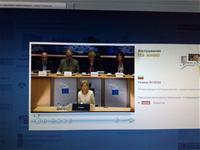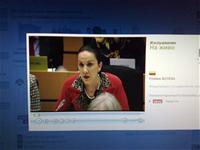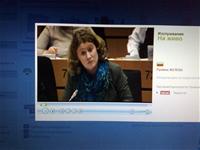Ruthless beginning of the hearing of Rumyana Zheleva in the EP
euinside, January 14, 2010
 For the first time since the beginning of the hearings in the European Parliament of the Commissioners-designate, the MEPs started from the very beginning raising harsh questions not only related to the field of the Bulgarian candidate but also about her past and present. The presidents of political groups in Parliament asked why Ms. Zheleva had not stated in her declaration for conflict of interests that she was in the management of a company during the period 2008-2009 when she was an MEP. Separately the Greens asked the Bulgarian candidate how could she do her job as a commissioner since Bulgaria is the only EU member states that has not yet approved the Development Strategy.
For the first time since the beginning of the hearings in the European Parliament of the Commissioners-designate, the MEPs started from the very beginning raising harsh questions not only related to the field of the Bulgarian candidate but also about her past and present. The presidents of political groups in Parliament asked why Ms. Zheleva had not stated in her declaration for conflict of interests that she was in the management of a company during the period 2008-2009 when she was an MEP. Separately the Greens asked the Bulgarian candidate how could she do her job as a commissioner since Bulgaria is the only EU member states that has not yet approved the Development Strategy.
Bulgaria has also refused to take part in the European Commission scheme for building of administrative capacity. "How in such a case can you be certain that you will be able to cope with  building the capacity for distribution of humanitarian aid", was the question. The Greens recalled the fact that in Bulgaria there was a debate on whether the news in Turkish stopped from broadcasting on the Bulgarian National Television, which proved that Bulgaria was incapable to cope with such a field as International cooperation, humanitarian aid and crisis reaction.The Greens also asked about Rumyana Zheleva's declaration against a conflict of interest.
building the capacity for distribution of humanitarian aid", was the question. The Greens recalled the fact that in Bulgaria there was a debate on whether the news in Turkish stopped from broadcasting on the Bulgarian National Television, which proved that Bulgaria was incapable to cope with such a field as International cooperation, humanitarian aid and crisis reaction.The Greens also asked about Rumyana Zheleva's declaration against a conflict of interest.
You can expect more news from last night's hearing of Ms. Zheleva later on euinside and her written answers to the questionnaire of the European Parliament you can read here.
![]() 14:48 Without precedent passed the first hour of the hearing of Rumyana Zheleva, a
14:48 Without precedent passed the first hour of the hearing of Rumyana Zheleva, a  Commissioner-designate for International cooperation, humanitarian aid and crisis reactions. Almost all of the time over Ms. Zheleva a lot of questions were poured about exactly when she left the management of the company Global Consult. The interrogation led to 2 procedures, during which the Bulgarian liberal MEP Antonia Parvanova was listened to after Ms. Zheleva said that she was the one to signal the Commission that there were irregularities in Ms. Zheleva's declaration against conflict of interest.
Commissioner-designate for International cooperation, humanitarian aid and crisis reactions. Almost all of the time over Ms. Zheleva a lot of questions were poured about exactly when she left the management of the company Global Consult. The interrogation led to 2 procedures, during which the Bulgarian liberal MEP Antonia Parvanova was listened to after Ms. Zheleva said that she was the one to signal the Commission that there were irregularities in Ms. Zheleva's declaration against conflict of interest.
The Bulgarian candidate for a commissioner assured the members of the committee that she had all necessary documents proving that she had not done anything wrong and she even asked her assistants to fetch a file with the documents. Some MEPs reacted angrily because the documents were translated into German only and requested another procedure for the withdrawal of the documents. More requests for procedures were unleashed, including for a temporary interruption of the hearing until the moods calm down so that the debate could continue on the subject.
 An interesting fact was that unlike most of the previous hearings, the time for questions and answers was extremely reduced - 30 seconds for a questions and another 30 seconds for the answers of Rumyana Zheleva. In previous hearings the time for a question was 1 minute and for an answer - 2 minutes.
An interesting fact was that unlike most of the previous hearings, the time for questions and answers was extremely reduced - 30 seconds for a questions and another 30 seconds for the answers of Rumyana Zheleva. In previous hearings the time for a question was 1 minute and for an answer - 2 minutes.
![]() 00:00 As Rumyana Zheleva had shown in her written answer and said in her expose in the beginning of the hearing that climate change will accelerate disasters and the need of humanitarian aid, most of the questions to her were related to the specific plans of the candidate for International cooperation, humanitarian aid and crisis reactions. In response Ms. Zheleva said that climate change was not actually in her sphere of duty but stated that activity could be found on political level.
00:00 As Rumyana Zheleva had shown in her written answer and said in her expose in the beginning of the hearing that climate change will accelerate disasters and the need of humanitarian aid, most of the questions to her were related to the specific plans of the candidate for International cooperation, humanitarian aid and crisis reactions. In response Ms. Zheleva said that climate change was not actually in her sphere of duty but stated that activity could be found on political level.
To illustrate this she quoted her participation as a foreign minister of Bulgaria in the climate change conference in Copenhagen where she had the chance to follow the discussion. According to her though, humanitarian aid was only one way of solving the problem but it was not a panacea. Using the right for a remark, there was another question for Rumyana Zheleva: "You've mentioned that you are a foreign minister of Bulgaria. Please comment on the fact that Bulgaria does not provide humanitarian aid".
The Bulgarian candidate replied: "When I took the position (of foreign minister) I was confronted by this fact and it was surprising for me that there is no single department to deal with this issue in the Ministry. This is new for the new member states. I am a minister for 6 months and I managed to establish a special department to deal with the Development policy and the Humanitarian aid. Indeed, the newcomers so far have not been donors but now they have signed and will provide humanitarian aid". euinside would like therefore to recall that indeed related to the Copenhagen conference the Bulgarian prime minister Boyko Borisov offered Bulgaria to contribute by 20,000 euro (20 thousand) to the Global Climate Change Fund, against the background of the 2.4 bn euro the EU as a whole will pay for the Fund in annually for the next 3 years.
The Dutch MEP Judith Sargentini from the Group of the Greens/European Free Alliance again raised the question about the company Global Consult, insisting to understand whether Ms Zheleva had sold the firm or just had its name changed. This forced the chairwoman of the Committee Eva Joly to remind her that the coordinators of the Committee were dealing with the issue and this issue should not be raised any further at the hearing. But after Sargentini's vigorous statement that she, as an MEP, had the right to know what the interests of the Commissioner-designate were, Rumyana Zheleva was given again the word to reply to the question. He called on the Dutch MEP to visit Bulgaria together with her and check on her own what the real business and property situation was. "Come with me, let us do it together! I am inviting you to come with me and see for yourself what the situation is".
![]() 10:54 With tout praise and words of comfort ended the 3-hour hearing of Rumyana Zheleva. Most of the MEPs tried to get concrete information about the future plans of the Commissioner-designate for International cooperation, humanitarian aid and crisis reactions. The answers of Ms. Zheleva however, were too general and could be deduced into the following sentences: "The important thing is to help the needing and to guarantee the safety of the humanitarian workers". "That is why we need to work with all acting people if this would be of any help and if this could guarantee the life of the humanitarian workers", "For us it is important to secure access for humanitarian aid".
10:54 With tout praise and words of comfort ended the 3-hour hearing of Rumyana Zheleva. Most of the MEPs tried to get concrete information about the future plans of the Commissioner-designate for International cooperation, humanitarian aid and crisis reactions. The answers of Ms. Zheleva however, were too general and could be deduced into the following sentences: "The important thing is to help the needing and to guarantee the safety of the humanitarian workers". "That is why we need to work with all acting people if this would be of any help and if this could guarantee the life of the humanitarian workers", "For us it is important to secure access for humanitarian aid".
Zheleva was also asked about the only specific issue, mentioned in her written replies as an initiative of the EU, which needs to be implemented because of the Lisbon Treaty - the creation of a Volunteering Corps. One of the many questions on the topic was what deadline she would put to establish the Corps, but she responded: "According to the Lisbon Treaty it must be created, as I said before I will appear again in front of this Committee with a concrete proposal and I hope this proposal to be presented before 2011 when is the European Year of Volunteering. This is why I would like to share with Parliament, with this Committee my initial ideas how to make this political idea work in practice".
A number of MEPs requested remarks and further questions because they were not satisfied with the replies of the Bulgarian candidate. For example at the question "What do you intend to propose to the Commissioner of Development and the High Representative with regard to the International humanitarian legislation violation?", Rumyana Zheleva said: "We will have to turn to third parties, calling on them to respect the International humanitarian law so that we could provide humanitarian aid. So, you mentioned Ms. Ashton, we will have, I guess, very good cooperation in the field of international humanitarian law".
To the additional questions what she would propose to help Sudan for solving the problem with the lack of drinking water as well as to create conditions the EU to play major role in the region, Zheleva responded: "Sudan is facing a lot of challenges - refugees, displaced people, the drinking water, the delivery of food. The European Commission is financing operations there for many years. We know what the specific situation is, there are a lot of events, foreseen in the annual programme of the Commission and, of course, this includes dealing with the drinking water issue".
And regarding the implementation of the new Action Plan of the Eu for Afghanistan, Zheleva was asked how does she intend to secure the delivery of humanitarian aid for this country. Here is her reply: "For us is important to secure an access for humanitarian aid. In the same time though this should not be considered as their task (of the Afghans). This would be in breach of the humanitarian principles". Another question followed asking for more details and whether she would attempt establishing relations with some modest Taleban so as to ask them for assistance, the candidate said: "As far as we know the Taleban control some 60% of the country. It is important that we have access for humanitarian operations as well as security of the humanitarian workers. This is why we have to work with all actors if this would be of any help and if this could guarantee the life of the humanitarian workers".